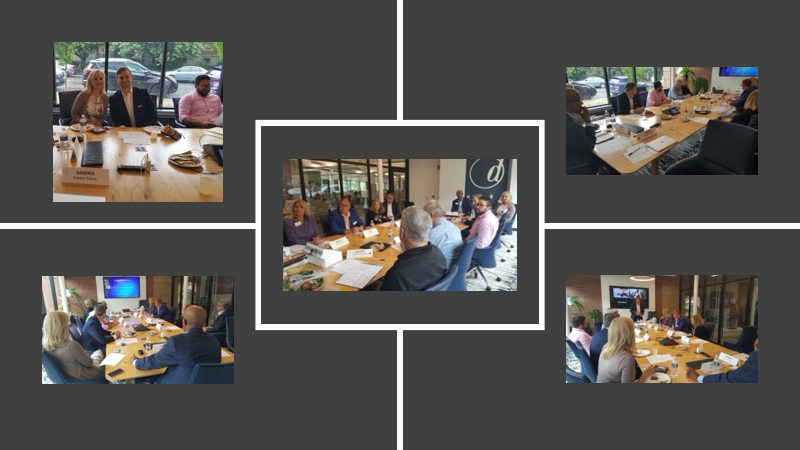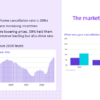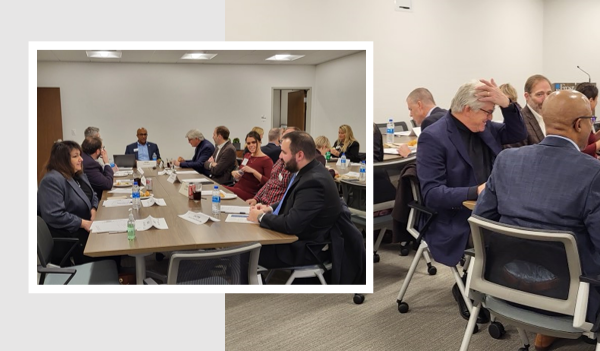Pittsburgh July 2022 – Key Take-Aways
Speaker Karl Kever, Bureau of Labor Statistics
Unemployment, May 2022: The national rate was 3.4 percent, compared to Pennsylvania statewide of 4.0 percent and Pittsburgh also at 4.0 percent. Compared to other metro areas in Pennsylvania, Pittsburgh is definitely improving. Unemployment was 6.6 percent in May 2021 and it’s now 4.0 in 2022. A history of unemployment in the Pittsburgh Metro area from January 2012 to May 2022 shows April and March of 2020 was the recession period. April 2020 was the highest unemployment rate for Pittsburgh in a 30-year history: 16.1 percent, compared to a national rate of 14.1 percent.
Pittsburgh has a good, diversified economy, with jobs spread out among different sectors. That helps to lessen the impact of downward pressures. Leisure and hospitality show the largest gain of 19.3 percent, but that’s simply recovering jobs lost two years ago.
Regarding decreased square footage of office space, the national business response survey shows the information sector is highest at 10.6 percent, followed by food and accommodation services at 9.6 percent in 2021, as a result of the pandemic. Information, manufacturing, and the food services sectors are trying to claw back what they lost.
Chip Desmone, Desmone Architects: We’re still hiring; will probably hire three more people this year, possibly four — architects. We have the largest backlog in our history and the largest opportunity list in our history. Multi-family continues to be a large chunk of business, but we are also seeing increased office activity, increased retail and service activity, also other hospitality such as hotels and event spaces. There’s a broader recovery happening in Pittsburgh, at least from the work we do in our office, so it’s a really good time.
Todd Pifer, AdVenture Development LLC: McCandless Crossing is 100 percent occupied, with two new stores, including a bridal shop that left Sewickley and moved into 3,500 square feet of space, so that will bring clients. Our project in McCandless Square, the retail part is getting ready to kick off. There will be a food hall, retail, more service-oriented — it’s in such a transitional area, with the largest park-and-ride for Port Authority. We’re going to have a daycare on our site (a national chain), and 53 multi-family homes. And in Raleigh, N.C., we’ve secured seven big anchor tenants that we’ll be announcing soon.
Angela Gillott, Burns Scalo Real Estate: We’re doing upgrades on space, especially with the pandemic and people wanting to come back to office, maybe get rid of open workspace and create a few more barriers. As of 2020, we’ve started a sub-program of sanitizations, touchless features, disinfectant fogging, steam-cleaning of carpets, wipe-downs of touchpoints. We work with Nanotouch, a self-disinfectant company that’s light activated and has a 90-day efficacy. The focus is on client amenity, making them feel more confident coming back.
Michael Mitro, Royal Oak Realty Trust: We buy properties under long-term leases. What we’re seeing is interest rates are impacting us significantly; we buy short- and long-term and with pricing up, cap rates moving up, we were buying 5.5 to 6.5 and now we’re at 6-7. We’re busy and winning less deals. The cost of capital has gone up, but investors continue to buy at lower cap rates. We’ve reduced our volume for this year. We have plenty of capital to use but it’s a matter of terms. Everybody expects long-term rates to come back down, and we’re hoping there’s no recession.
Dusty Kirk, Reed Smith LLP: Our real estate group is busy across our platform in the U.S. and in London as well. A lot of what we’re seeing are portfolio sales; in Pittsburgh, a lot of retail is selling before cap rates go up, but what we are seeing — in not just our firm, but in other big law firms as well — is corporate mergers are slowing down. Corporate work itself is slowing down, litigation is slower; we anticipate bankruptcy might pick up. If leases come through and interest rates go up, there may be more financial issues. But right now, the real estate group is really busy.
Jennifer Bartholomew, UBS: We do commercial and residential mortgages; rates are very pro-client. We focus on high-network space, clients who are businesses that may be “un-lendable” according to Fannie Mae guidelines. We have amazing underwriters who can find income, and we’re fully regulated like all banks.
Perry Ninness, UBS: We’ve got $500M in assets; about 350 families in Western Pennsylvania. We’re a five-person group. We have a number of pension funds, a number of 401Ks and IRAs, and access to investment banking, the New York Stock Exchange, and we can be a conduit for security-backed lending that allows clients to work off the balance sheet.
Gene Boyer, Burns Scalo Real Estate: We remain bullish on office [development]; we believe the pendulum will swing back. Culture is what creates great companies, and you can’t create culture in a Zoom box. We are designing highly amenitized spaces; the office has to be a tool to recruit and retain top-notch talent. We have The Riviera on the river, a luxury life science building. It started as a Class A luxury office building, but the market told us we need a luxury life science building. We’re seeing smaller, more efficient spaces.






Recent Comments